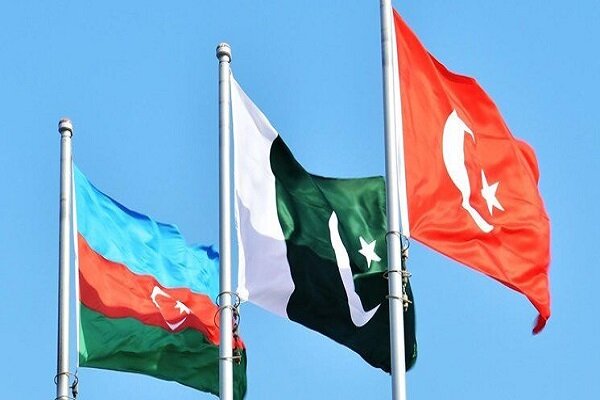Implications of Pakistan, Turkey, and Azerbaijan’s Geopolitical Cooperation for Iran

Guest Commentary by Ehsan Moheddian: The leaders of Turkey, Azerbaijan, and Pakistan are increasingly strengthening thier alliance. this not only promotes a specific religious and military discourse but also represents clear strategic interests.
A recent trilateral meeting was held in Islamabad between the parliamentary heads of Azerbaijan, Pakistan, and Turkey. The parties examined regional threats, security concerns, and ways to boost interparliamentary collaboration.
Expansion of Trilateral Military Cooperation
Military cooperation forms a important part of interactions between Baku and Islamabad. Baku has chosen the JF-17C fighter jet-jointly developed by China and Pakistan-to replace its aging MiG-29 fighters. approximately 60 units of this aircraft were planned for purchase. Modernizing air forces is crucial for any armyS growth; Azerbaijan is actively pursuing this path while Armenia-its past military adversary-has made almost no significant efforts to strengthen its armed forces.
The JF-17Cs have been deployed only once in combat operations; their full capabilities remain somewhat uncertain. Nevertheless, they are modern aircraft compared to Armenia’s current scattered acquisitions made without a clear strategy.
Turkey’s military cooperation with Pakistan also has deep roots spanning various sectors: defense industries, military affairs, and security domains. Under the MILGEM project in Pakistan, there is an agreement with Turkey to construct two warships domestically within each country plus two others in Karachi-with full technology transfer planned to Turkey.
Meanwhile, Pakistan ordered 30 Turkish T-129 ATAK helicopters. Both countries collaborate on employing Turkish drones like Bayraktar TB2s as well as joint drone development projects involving related technologies such as combat aircraft modernization electronic warfare systems-and simulators.
The three countries conduct joint military exercises with troop exchanges focused particularly on the Caucasus region; they also participate jointly in each other’s military academies. Counterterrorism intelligence-sharing mechanisms operate among their security agencies through established joint committees aiming at enhanced coordination along with efforts to bolster naval capabilities-including fleet modernization programs like upgrading Pakistan’s Agosta 90B submarine by Turkey-and local warship production based on transferred technology continues steadily.
The Role of Corridor connectivity in Strategic Alignment
This growing collaboration stems chiefly from their converging strategic geopolitical outlooks; all three share common perspectives on defining terrorism policy frameworks for combating it effectively-as well as ideal political stability models regarding Central Asia and South Asia-and align closely over Afghanistan-related security matters.
their shared interpretation of political Islam combined with mutual interest supporting Muslim Brotherhood-aligned discourses brings them further together diplomatically.
Turkey, Azerbaijan & Pakistan ofen employ unified diplomatic language within international organizations while providing reciprocal support across foreign policy stances-a trend accelerating due to multiple factors.
Turkish Parliament Speaker Numan Kurtulmuş stated during this trilateral session that a collaborative mechanism among these states should transform into “a enduring platform for partnership” embracing defense sectors including industry development initiatives.
Kurtulmuş emphasized that as azerbaijan controls parts of Caucasus territory facilitating advanced peace negotiations with Armenia-the positive changes here plus existence of Zangezur corridor allow regional nations closer economic-political-humanitarian ties alongside opportunities such as strategically reinforcing what is referred to as “Middle Corridor.”
This particular focus on Zangezur & Middle Corridors arises because both Turkey & Azerbaijan repeatedly consider these routes foundational elements forming a new transport belt from Pakistan through europe-a corridor excluding Iran entirely-which risks adverse economic-political-security impacts for Tehran.
During the meeting’s discussions one Turkish proposal included integrating Iraq’s ’Pathway Development’ project into this route allowing expansion toward middle Eastern markets economically.
The resulting trilateral corridor network isolates Iran geopolitically from major global shipment pathways carrying goods & energy resources-a stratagem unwelcome by Russia & China too amid rising tensions with US-led Western alliances since allied control over transit routes could pose future strategic challenges affecting them sharply.
This dynamic reflects growing alignment among Turkic world nations whose expansion invites more interested players altering regional power balances against Iran alongside Russia & China interests substantially.
Iran’s Strategic Options
A complex mix of needs drives pakistani outreach toward such collaborations where Tehran could redirect Islamabad toward deeper sustainable partnerships by addressing shared concerns quickly.
Alongside emphasizing longstanding cultural-historical bonds Iran should escalate bilateral defense-security ties actively.
Developing trade-economic integration holds equal value: properly implementing preferential trade agreements cutting tariffs building special economic zones jointly would help reduce trade imbalances speeding Pakistani growth trajectories considerably.
An Energy Security Viewpoint
Energy access stability plays critical role too since Pakistan plans working closely now w ith Azerbaijani partners securing hydrocarbons – oil/gas/LNG supply chains plus petroleum product imports aimed at overcoming persistent shortages.
Iran can enhance influence meanwhile diversifying Pakistani energy portfolio via completing pipeline projects transporting Russian gas through Iranian territory onward into Pakistani grid networks effectively leverage geopolitical benefits accordingly.
Corridor Infrastructure Potential
Furthermore Iran stands positioned uniquely linking ports Chabahar up via cross-border railway connecting Incheborun Caspain Sea ports Astara presenting ideal corridor joining southern Asian commerce lines passing into Caucasus/ Central Asia realms where missing out structural timing would be costly historic opportunity lost permanently.
Bilateral Investment Dynamics
Azerbaijan pledged around $2 billion investments spread across energy infrastructure mining sectors easing constraints faced by cash-strapped capital-poor Pak demands underserved basic infrastructural upgrades urgently needed nationally .
Most pledges currently under negotiation or infrastructure planning stages mainly targeting highway network expansions:
Examples include $1.2 billion spent developing expressway linking Sukkur-Hyderabad cities followed by approximately $600 million invested improving Hyderabad-Karachi highway quality efficiently expediting freight passenger flows transportation demand .
Socar State Oil Company commits nearly $600 million financing White Oil pipeline transmitting refined products Punjab Province Khyber Pakhtunkhwa Region northwest zone supply logistics alike;
Other estimated half-billion-dollar ventures appear aligned under diverse transport-energy ICT tech projects envisioned mutually beneficial evolving portfolios continuing progressively .
Hence Tehran must orchestrate enabling frameworks encouraging similar ecosystem developments scheduling technical expertise leveraging Russian-Chinese knowlege assets expanding collaborative gains successfully sustaining convergence trends before adversaries capitalize rapidly elsewise securely.


